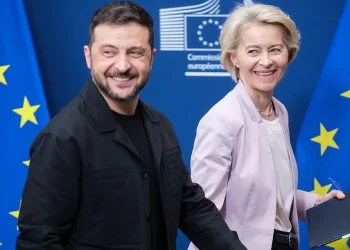Trump Suggests Palestinians Leave Gaza Permanently During Meeting with Netanyahu
In a bold statement on Tuesday, President Donald Trump expressed his belief that Gaza has no future as a permanent home for Palestinians, calling the area “uninhabitable” and suggesting that Gazans should leave the region for good. He described the war-torn enclave as “a big pile of rubble” and argued that Palestinians had no other choice but to relocate, perhaps to a new location in the Middle East provided by one or more nations.
“I mean, they’re there because they have no alternative. What do they have? It is a big pile of rubble right now,” Trump said ahead of his meeting with Israeli Prime Minister Benjamin Netanyahu in the Oval Office.
Trump’s comments, which suggest that Palestinians permanently leave Gaza, are likely to resonate with Israel’s far-right but are expected to face opposition from neighboring countries in the region, which have expressed reluctance to accept new Palestinian refugees. He framed the issue as a humanitarian concern, asking, “Why would they want to return? The place has been hell.” Despite a reporter’s interruption, saying, “Because it’s their home,” Trump remained firm in his view that Gaza is not a place for people to live.
Instead of Gaza, Trump suggested that Palestinians should be offered a “good, fresh, beautiful piece of land” elsewhere to call home. “Gaza has been very unlucky for them,” he continued, reiterating his belief that Gazans should not return to the strip. Netanyahu, seated alongside Trump, smiled as the U.S. President spoke.
Netanyahu’s Visit and Gaza Truce Talks
Netanyahu’s visit to Washington was focused on discussions regarding the next phase of the ceasefire in Gaza, as well as broader issues in the Middle East. The Israeli Prime Minister was looking for clarity on Trump’s position in the aftermath of the ceasefire agreement. Trump, despite being involved in efforts leading to the ceasefire, admitted that he had no guarantees about its longevity, stating, “I have no assurances that it’ll hold.”
However, Trump was slightly more optimistic a day later, saying, “We’ll see what happens. We’re dealing with very complicated people, but a deal can absolutely get done.” The talks also touched on the question of Gaza’s future and Trump’s suggestion that Palestinians could be relocated to Egypt or Jordan for rebuilding. He repeated, “Look, the Gaza thing has not worked. It’s never worked.”
Trump and Netanyahu’s Relationship and Broader Middle East Strategy
The discussions between Trump and Netanyahu extended beyond the ceasefire, with Trump also addressing the possibility of a broader normalization of relations between Israel and its Arab neighbors, particularly Saudi Arabia. Trump, who has expressed a desire for a Nobel Peace Prize, sees such a development as a way to transform the Middle East and strengthen ties against common threats, such as Iran.
While Netanyahu might seek further diplomatic discussions, speculation surrounds whether he could use his meeting with Trump to press for a more direct confrontation with Iran. Trump, however, has been hesitant about launching a new conflict with Iran, expressing hopes that tensions could be resolved without escalating to military action.
U.S.-Israel Relations Under Trump and Biden
Under the Biden administration, tensions between the U.S. and Israel have been notable, particularly with President Biden’s strained relationship with Netanyahu. During Biden’s presidency, the two leaders went months without speaking, despite the ongoing conflict in Gaza. However, Trump’s return to the White House has been met with warmer reception from Netanyahu, who has long aligned with Trump’s policies.
During his presidency, Trump lifted restrictions on weapons sales to Israel and has shown a willingness to indulge Netanyahu’s requests. Netanyahu is now seeking approval from Trump’s administration for additional arms sales, including bombs, missiles, and artillery.
Despite the warmth between Trump and Netanyahu, the relationship between Trump and Biden, particularly regarding Israel, has been less cordial. Trump has openly criticized Netanyahu, especially after the 2020 election, when he accused the Israeli Prime Minister of betrayal for congratulating Biden on his victory. In recent months, Trump also expressed dissatisfaction with Netanyahu’s preparedness during the Hamas attacks on Israel.
As Netanyahu remains in Washington for additional meetings and discussions, the future of the Middle East and U.S.-Israel relations hang in the balance.
This article was rewritten by JournosNews.com based on verified reporting from trusted sources. The content has been independently reviewed, fact-checked, and edited for accuracy, neutrality, tone, and global readability in accordance with Google News and AdSense standards.
All opinions, quotes, or statements from contributors, experts, or sourced organizations do not necessarily reflect the views of JournosNews.com. JournosNews.com maintains full editorial independence from any external funders, sponsors, or organizations.
Stay informed with JournosNews.com — your trusted source for verified global reporting and in-depth analysis. Follow us on Google News, BlueSky, and X for real-time updates.














